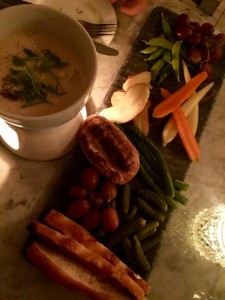Ladybird, located in a space that ironically used to be a meat and cheese fondue locale (The Bourgeois Pig), has managed to impress a gamut of New York City diners with a fully vegan menu. An omnivore myself, I enjoy earth’s bounty of fruit and veg as much, if not more at times, than meat. However, limited animal protein and a focus on plant-based foods is one thing, whereas vegan territory is a different “beast.” Particularly with vegetarian mainstays like cheese and eggs being forbidden by the vegan mantra, chefs truly need to get creative to pique diners’ interest. Below is a sampling of what we tasted, all kind of mysterious, given that there obviously was no cheese or pate at our table.
- Chardonnay Fondue – served with focaccia & seasonal vegetables
- Roasted eggplant with tofu ricotta cream
- Mushroom truffle pate
- Saganaki – Flaming soy mozzarella, smoked carrot, chive pesto
So deliciousness aside (I was quite impressed!), one qualm I have with Ladybird (and most vegan menu items, really) is the determination to make dishes into something they are not. Instead of listing the cashew and coconut crème ingredients in the “fondue,” the menu feigns normalcy.
On this topic, Alan Sytsma and Adam Platt verbalize my feelings succinctly in Episode 19of the Grub Street Podcast. When speaking of veggie burgers in particular, the two nail it in banter about the transition of highly ritualized foods in an ever evolving food environment:
Alan Sytsma: The thing that I have often thought is, why is there this desire to turn vegetables into a dish that’s only successful because it works with meat? Why not find the thing that vegetables are good for, instead of trying to re-create the experience of eating beef with soybeans?
Adam Platt: Well, the answer is that the chefs are getting more canny and focusing on it. The top chefs didn’t used to worry about this stuff. They worried about getting their perfect engorged foie gras, searing it beautifully with sauces. These guys are taking those techniques, and food science, and applying it to the veggie burger. Whereas before, the people who made veggie burgers were stoned line cooks in San Diego. So these are top, trained chefs. And, like Brooks Headley, they’re food-lab wizards. So the science, if you could call it that, is there now. They figured out how to not just re-create the somewhat-accurate taste of a real burger. Although it’s ultimately not. It’s not really beef, and you don’t have this great umami. But they’ve made it look like a real beef burger, and they’ve made it feel, texturally, like a beef burger, both in your hand and sort of in your mouth. So they’ve created the highly ritualized, satisfying experience of eating a beef burger, but it happens to be vegetable.
The veggie burger is the most conspicuous part of this trend. A top chef now is not just a cook. They’re socially engaged, politically involved … in the ideas of the times. They’re like philosopher kings. The food world is that way now. It’s linked to the environment in ways we never thought about, even 10, 15 years ago. Like Dan Barber and David Chang, they’re preaching the gospel. The veggie burger is one of the easiest ways, and most popular ways to preach this gospel.
So while I do agree that Ladybird is creating an experience far superior to the antiquated tofu chunk or carb-heavy vegan option, and I agree wholeheartedly with the food science involved in re-creating staple food “experiences” for different dining preferences, why not just say what it is? Cashew cream. Mushroom based “béchamel” style sauce. Lemon herb tofu. Those all sound delicious too, so why not own it?